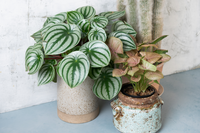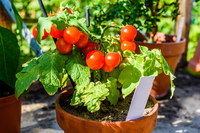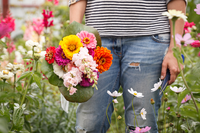
For genuinely spectacular flowers in September, the houseplant strelitzia takes some beating. With its tufts of flaming orange petals, like the head of a fabulous exotic bird, it’s easy to see why it’s called the bird of paradise plant or the crane flower. Big blue-grey leaves, like those of the banana plant, add to the tropical appeal of this striking plant. Native to South Africa, strelitzias usually flower in spring and summer, although indoor-grown plants may produce flowers at any time of year.
Classic strelitzia
The most readily available strelitzia is the classic orange-flowered Strelitzia reginae. There’s also a yellow-flowered variety called Strelitzia ‘Kirstenbosch Gold’ or ‘Mandela’s Gold’, which can be harder to find.
White-flowered Strelitzia nicolai is called the giant bird of paradise plant because it can grow to 10m (33ft) tall. In a pot, it won’t reach those dizzy heights, but it’s still a plant for a large conservatory rather than a greenhouse.
Growing strelitzias indoors
Strelitzias prefer a humid atmosphere, so they do better in a conservatory or greenhouse than in a centrally heated house where the dry air can be a problem for them. They are not frosted hardy. In their native environment, where winters are dry, they can cope with the occasional very light frost, but in colder, wetter climates they need a minimum winter night temperature of 10-12ºC (50-54ºF). In summer, ventilate greenhouses or conservatories when the temperature rises above 20ºC, or move your strelitzias outside for the summer.
Tips on caring for strelitzias
- Plant your strelitzia in a loam-based compost such as John Innes No.3, with added grit to improve drainage.
- Water regularly in spring and summer to keep the compost consistently moist but not soaked. Reduce watering in autumn, and in winter let the compost around the roots dry out between waterings.
- Between April and September, feed fortnightly with a liquid houseplant feed.
- In spring, remove any tatty old leaves, cutting them off at the base of the stem.
- Remove flowers as they fade.
- Top dress containers every year, replacing the top 5cm (2in) of compost with fresh, and re-pot plants every couple of years.
What to do if your strelitzia is not flowering
Strelitzias don’t flower until they are between 6-10 years old, so to make sure yours is old enough, buy one that is already in flower. Alternatively, enjoy your young strelitzia as a foliage plant until it is mature enough to flower.
On mature plants, a lack of flowers is a sign that the plant is not happy with its growing conditions. Make sure it has a humid environment with bright light, and feed regularly.
Watch out for red spider mites, mealybugs and scale insects on greenhouse-grown strelitzias, and treat early with biological controls or pesticide sprays before infestations get established.




